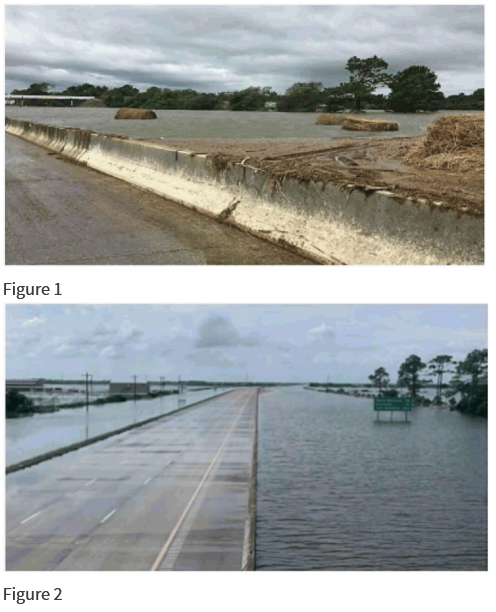In DeVillier v Texas, SCOTUS Allows State Law Flooding Claims to Proceed in Federal Court
The United States Supreme Court allows property owners to pursue claims attributable to flooding of their properties caused by a dam built to protect a hurricane evacuation route.
The Supreme Court just issued a new, unanimous takings opinion called DeVillier v Texas.
“The State of Texas undertook several projects to facilitate the use of that portion of the highway as a flood-evacuation route. It installed a roughly 3-foot-tall barrier along the highway median to act as a dam, preventing stormwater from covering the south side of the road…. The new median barrier performed as intended, keeping the south side of the highway open. But, it also flooded petitioners’ land to the north, displacing them from their homes, damaging businesses, ruining crops, killing livestock, and destroying family heirlooms.” The opinion includes photographs depicting the road open to the south and the devastating flooding to the north.

A series of lawsuits were consolidated in federal court. They alleged taking claims under both the United States and Texas Constitutions.
Texas sought dismissal of the federal claims, raising “the question whether a plaintiff has a cause of action arising directly under the Takings Clause” of the United States Constitution. The issue focused on whether the Fifth Amendment allows a lawsuit against a state directly, in other words, whether it is “self-executing.” Congress has enacted laws allowing Fifth Amendment lawsuits against other governmental entities but not states. The Supreme Court reversed the Court of Appeals, holding that the property owners could proceed in federal court to litigate their state law claims. The opinion does not answer whether the owners could pursue a federal remedy to the extent that their state law claims were not successful. “The question presented asks what would happen if a property owner had no cause of action to vindicate his rights under the Takings Clause. It would be imprudent to decide that question without satisfying ourselves of the premise that there is no cause of action…. Texas state law provides a cause of action by which property owners may seek just compensation against the State…. DeVillier and the other property owners should be permitted to pursue their claims under the Takings Clause through the cause of action available under Texas law.”
The case is important because it rejected Texas’s assertion that states can never be subjected to federal takings claims. But it did not go so far as to confirm that the claims could be pursued. Congress should react by enacting a law affirming that Fifth Amendment takings claims can be pursued against states.
In addition to formal condemnation matters, I have handled the type of de facto taking claim addressed in this case. I have also addressed flooding issues, which are usually not as factually obvious as the facts presented in this case. Please feel free to contact me about any eminent domain issues.
 Thursday, April 25, 2024 at 1:10PM
Thursday, April 25, 2024 at 1:10PM 
Reader Comments